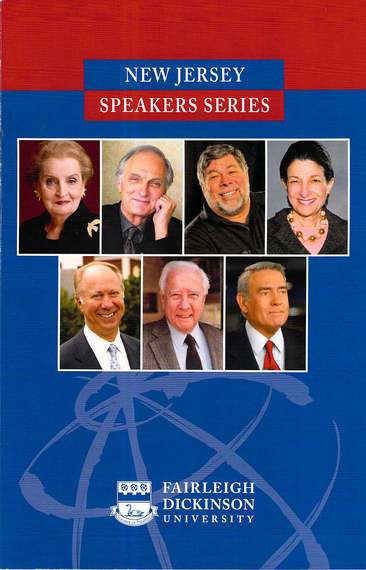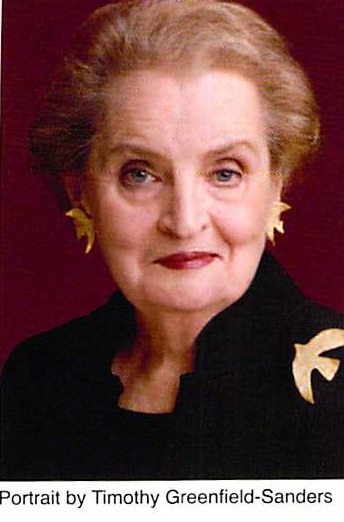Over the next few months I will be attending The New Jersey Speaker Series, an inaugural series of talks produced by Fairleigh Dickinson University. The impressive list of speakers are Madeleine Albright, Alan Alda, Steve Wozniak, Olympia Snowe, David Gergen, David McCullough and Dan Rather, each influential voices in today's world.
Part One: An evening with Former Secretary of State Madeleine Albright.
From time to time we have pre-conceived notions about people. As much as we try not to, we do. Last week while I was on my way to hear Madeleine Albright speak, I feared that her presentation might be dull and boring. After all, talking about sanctions against Iraq or the American policy in Bosnia is certainly interesting and educational, but it can also be very dry.
I couldn't have been more wrong.
Like any good comedian, sorry I mean speaker, she warmed up the audience with a great story:
To the announcer, "Thank you for telling everybody who I am. Not everybody always knows. (Laughter) Not long ago I was coming back from China, and Chicago was the first port of entry, and as I was getting undressed for the security people (laughter) one of the guards noticed me and said, 'Oh, my gosh it's you.' (Laughter)
Then he went on to say, 'I'm from Bosnia, and if it weren't for you in Bosnia there wouldn't be a Bosnia and you are always welcome back to Bosnia.' Then we had our picture taken and it screwed up the whole line. (Laughter)
Then I go back to get my stuff and the lady who was in back of me said, 'So what exactly happened here?' and I told her I used to be Secretary of State and she said, 'Of Bosnia?'"
(Big laughter)
Madeleine Albright's biography tells an incredible tale: The first female Secretary of State. Fled with her family from Prague during the Nazi invasion and again years later from the Communists. Received various degrees from Wellesley College, Johns Hopkins and Columbia University. Worked on Edmund Muskie's campaign that led to an appointment as The National Security Council's liaison during the Carter White House. Worked as a Democratic Party foreign policy advisor and briefed Vice Presidential and Presidential candidates Geraldine Ferraro and Michael Dukakis. Appointed as Ambassador to the United Nations. Awarded The Presidential Medal of Freedom by President Obama.
It's clear from this condensed biography that an entire post (or more) could easily be devoted to writing about Dr. Albright's stellar career, her policies and positions on national and global affairs, or about the fascinating life she's lead. But I'll leave that to her by directing you to two of the many books she's written: "Madam Secretary: A Memoir" and "Prague Winter: A Personal Story of Remembrance and War (1937 - 1948)."
Instead I'll focus on Madeleine Albright the woman, because as I thought about her presentation and candid answers to the audiences' questions, I realized what a powerful advocate she is for woman's rights. She's an outstanding example for women on the importance of speaking their minds and believing in themselves.
Story One: Albright told the story of the first time she entered The White House as Secretary of State. While walking into that glorious house it occurred to her that the portraits hanging on the walls collectively had one major difference between them: whether the subjects wore a beard or not. She hoped that one day that would change to the difference being whether the subjects wore heels or not.
Story Two: Soon after she was married Albright had twin daughters and, as she said, "I tried to figure out how to be a good mother, because as every mother here knows, every woman's middle name is Guilt. When you're home you wish you were working, and if you're working you wish you were home. In my case I was lucky to have jobs with a great deal of responsibility when my children were older. They were taking care of me.
Once, as my daughter was taking care of my bills she called me and said, 'Mom, did you really need those pair of shoes?'
I'm often asked about the balance issue, and I don't think there is any (one) answer. Everyone has to develop their own answer, realize that it's very difficult, and people are judgmental on what we've chosen. The hardest were the judgments that other women made on me. We have to be nicer to each other and be more respectful of our choices.
For me, everything about women and in life is about CHOICE."
Story Three: Dr. Albright owns a large collection of costume jewelry including many pins. Her pins are an extension of how she's feeling on a given day. On a good day she'll wear a butterfly; on a bad one a bug.
On a trip with President Clinton to visit Russian President Vladimir Putin, a leader she openly dislikes, Albright decided to wear her monkey pin. President Putin noticed it, and knowing that her pins represented an unspoken Albright thought, he asked President Clinton why she was wearing a monkey. Never one to hold back, Albright quickly blurted out, "Because I think your policy in Chechnya is evil." Putin was furious, President Clinton looked at her "like I was out of my mind and I was in trouble."
Story Four: When her time at The White House was over, she thought it would be a difficult transition for her to leave. (Sound like Empty Nest Syndrome?) But she quickly learned that leaving was a chance for a fresh start to try something new. She began to teach, write, "and listen, and I refuse to ever be silent because we all need to speak out and have the moral courage to face the issues of the day."
By the end of the evening the audience and I got to know "the real" Madeleine Albright. She is funny, outspoken, intelligent, savvy, sometimes controversial, always honest, and ever mindful of the lessons her parents taught her.
"Never take liberty, freedom or the greatness of America for granted." I am sure they'd be proud of the accomplishments of their exceptional daughter.
Photo Credits: Courtesy of Fairleigh Dickinson University/NJPAC:New Jersey Speaker Series.
Portrait of Madeleine Albright by Timothy Greenfield-Sanders
Read and subscribe to Cathy Chester's work on her blog, An Empowered Spirit
Follow her on Twitter at @CathyChes
Earlier on Huff/Post50:


